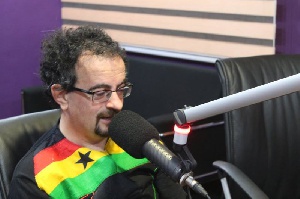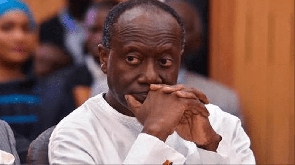The British High Commissioner, Jon Benjamin, yesterday said his mission is opposed to a social media ban, describing such an action as a wrong thing to do.
The opposition was an apparent reaction to the recent suggestion by the Inspector General of Police (IGP) John Kudalor that he would order such a ban on election day, “should the need arise.”
The IGP, as if he was rehearsing from a script, has been campaigning on the possibility of shutting down the social media, despite wise counsel by eminent Ghanaians and international bodies like United Nations (UN) office in West Africa.
The British envoy stated the position of the mission during an interaction with a cross-section of the media at the British High Commission in Accra. He said about the ban, “We hope that it does not happen.” He added that such an opposition by Britain is not restricted to Ghana, but worldwide.
On the drawbacks of social media, he said those are the cost of freedom of speech, adding that Ghana too opposes such a ban, having appended its signature opposing such an action during an international forum supporting the freedom of the internet.
In spite of the drawbacks of social media such as posting untruths, it is still preferable as it offers “the opportunity for news to be disseminated.”
The high commissioner, known for his obsession with the social media – his tweets attracting a lot of followership – has stoked various political controversies on the political landscape. “I am a fan of social media,” he said.
Mr Jon Benjamin disclosed, “In Britain we are encouraged to be active on social media,” and added that although mistakes could be made by and large, “it is better not to ban it but to allow the status quo. It is against mass communication.”
He took the opportunity to explain that diplomacy today is a departure from what it used to be and so diplomats are not barred from being expressive about local developments, which he had often done, his remarks spanning politics to sports.
“Diplomats used to be regarded as elitist, snobbish and unapproachable,” he said, to explain why his approach to diplomacy varies from what it used to be.
Jon Benjamin, in a bid to encourage the media to contact the mission whenever there is a subject requiring clarification, urged, “Whenever there is an issue, ask us; we would never say ‘no comment.’”
“The British mission is open to all media establishments in the country and would only consider a blacklisting option in cases where such radio stations or newspapers are engaged in disseminating hate speeches or messages that are inciting in nature” the High Commissioner said.
Stuart Taylor, head of the Political and Communication Desk of the mission, pointed out, “We are active on social media. When Jon Benjamin arrived he was in the middle of a social media rise. We are here in the best interest of Britain.”
The British High Commission, the Political Desk boss went on, was ready to address all queries, adding, “The ‘no comment’ response is not good enough.”
General News of Friday, 12 August 2016
Source: dailyguideafrica.com













